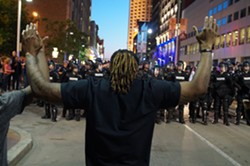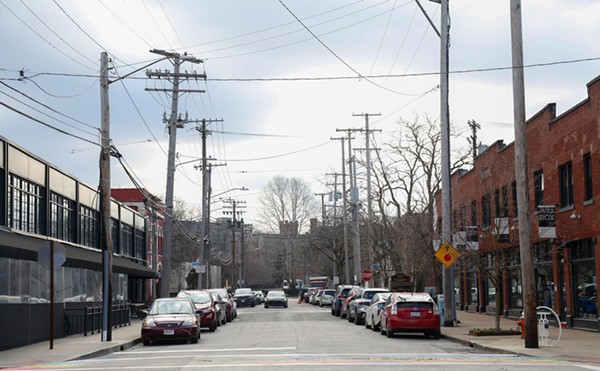
In essence, they insist, Cleveland police officers infringed on a lawful and protected protest with no mention of cause nor hint at allegations of unlawfulness. The narrative that we're reminded of in this lawsuit is one of premeditation: At one point, one of the legal observers of the protest was slapped with plastic handcuffs and asked by a police officer “Did you come out here to be arrested today?”
As day turned to night, almost infamously at this point, the police officers' riot gear-clad clampdown became more pronounced.
Many will recall the critical moment during the protests when police had corralled protesters within Johnson Court, between West 6th and West 9th: "After some unlawful arrests had already been made, Defendants herded the protesters and observers to a small alleyway, blocking the exits with armed officers to prevent movement. ... Minutes later, the Defendants began to arrest the protesters and observers, ostensibly for failing to comply with an order to disperse which no one heard and which was made impossible by the officers’ own actions in preventing exit."
The resulting arrests kept dozens locked up for nearly 36 hours, because, as the deputy chief of police put it, "From my perspective, it doesn’t make much sense to cite and release the protesters and let them back out on the streets to protest again.” This notion plays a major role in the plaintiff's allegations of constitutional rights violations: "unlawful seizure and extended detention."
The civil complaint includes many vivid details from the protesters' time on the streets and behind bars (black mold, cockroaches, bed bugs, overcrowding, no showers, brown tap water). Detainees were trucked off to the overflow jail facilities at Aviation High School. The prosecution involved multiple court hearings over misdemeanor charges of "failure to disperse," which were ultimately dropped in the defendants' favor. Still yet, subsequent visits from the FBI haunted the protesters up until the Republican National Convention one year later.
Scene spoke with many protesters as they left jail in the following days, and their quotes ring loud and clear two years on.
"We were in the workhouse, it was disgusting," one man explained. "The beds were disgusting, we were getting sick as we were sitting there breathing in that air."
Another backed that up: "Yeah, I was held in the workhouse. It was terrible, I don't think there was anybody in there before us or that it had been cleaned since it was built. The mats we were given had holes ripped through them, the water was disgusting. There was a water fountain, right? The water came out piss-yellow, so no one touched it. We demanded water. So they bring us a cooler of water — piss yellow. Another 30 minutes goes by, another cooler of water — piss yellow. Another 30 minutes, piss yellow. Smelling like fucking eggs. There were spiders everywhere. There was a thing of spoiled milk underneath my bunk — five cartons of spoiled milk from April 20th."
Read the full civil complaint below.
The nightmarish scenario and prolonged criminal cases has prompted what one would consider a chilling effect; in the immediate aftermath of the Brelo situation and in the ensuing two years, attorneys argue, protesters who were ensnared in the court system are generally less inclined to publicly protest now. This is how things like constitutional rights are worn down: simply by the daily goings-on of the criminal justice system, slowly and nearly out of sight.
Point-blank, the attorneys suggest: "Many law-abiding citizens, including some Plaintiffs, are now understandably reluctant to attend or participate in lawful protests within the City of Cleveland." There has not been a public protest on the scale of the May 2015 events since then — even when a Cuyahoga County grand jury in December 2015 declined to indict officers Timothy Loehmann and Frank Garmback in the shooting death of Tamir Rice.
The protesters seek relief from the court and relevant damages, including the spectrum of costs amassed during their jail time.
Workman et al v. City of Cleveland et al by sandyatscene on Scribd













